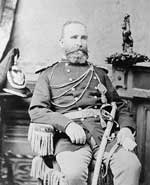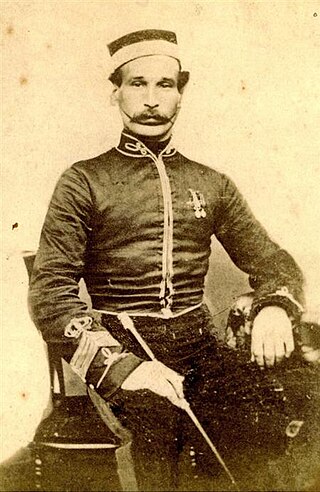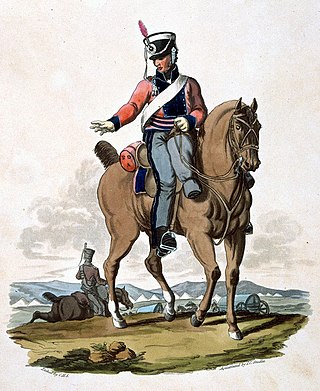Related Research Articles

A ballad is a form of verse, often a narrative set to music. Ballads derive from the medieval French chanson balladée or ballade, which were originally "dance songs". Ballads were particularly characteristic of the popular poetry and song of Britain and Ireland from the Late Middle Ages until the 19th century. They were widely used across Europe, and later in Australia, North Africa, North America and South America.

"The Ballad of the Green Berets" is a patriotic song in the ballad style about the United States Army Special Forces. It is one of the few popular songs of the Vietnam War years to cast the military in a positive light. In 1966, it became a major hit, reaching No. 1 for five weeks on the Billboard Hot 100 and four weeks on Cashbox. It was also a crossover hit, reaching No. 1 on Billboard's Easy Listening chart and No. 2 on Billboard's Country survey.

The Battle of Inkerman was fought during the Crimean War on 5 November 1854 between the allied armies of Britain and France against the Imperial Russian Army. The battle broke the will of the Russian Army to defeat the allies in the field, and was followed by the Siege of Sevastopol. The role of troops fighting mostly on their own initiative due to the foggy conditions during the battle has earned the engagement the name "The Soldier's Battle."

A balaclava, also known as a monkey cap, balaclava helmet, ski mask or shiesty, is a form of cloth headgear designed to expose only part of the face, usually the eyes and mouth. Depending on style and how it is worn, only the eyes, mouth and nose, or just the front of the face are unprotected. Versions with enough of a full face opening may be rolled into a hat to cover the crown of the head or folded down as a collar around the neck.

The Battle of Balaclava, fought on 25 October 1854 during the Crimean War, was part of the Siege of Sevastopol (1854–55), an Allied attempt to capture the port and fortress of Sevastopol, Russia's principal naval base on the Black Sea. The engagement followed the earlier Allied victory in September at the Battle of the Alma, where the Russian General Menshikov had positioned his army in an attempt to stop the Allies progressing south towards their strategic goal. Alma was the first major encounter fought in the Crimean Peninsula since the Allied landings at Kalamita Bay on 14 September, and was a clear battlefield success; but a tardy pursuit by the Allies failed to gain a decisive victory, allowing the Russians to regroup, recover and prepare their defence.
"Lillibullero" is a march attributed to Henry Purcell that became popular in England at the time of the Glorious Revolution of 1688.

The Thin Red Line described an episode of the Battle of Balaclava on 25 October 1854, during the Crimean War. In the incident, around 500 men of the 93rd Sutherland Highlanders led by Sir Colin Campbell, aided by a small force of 100 walking wounded, 40 detached Guardsmen, and supported by a substantial force of Turkish infantrymen, formed a line of fire against the Russian cavalry. Previously, Campbell's Highland Brigade had taken part in actions at the Battle of Alma and the Siege of Sevastopol. There were more Victoria Crosses presented to the Highland soldiers at that time than at any other. The event was lionised in the British press and became an icon of the qualities of the British soldier in a war that was arguably poorly managed and increasingly unpopular.

The Broadside Tapes 1, alternatively known as Broadside Ballads, Vol. 14, was a compilation of demo recordings done by Phil Ochs for Broadside magazine in the early-to-late 1960s. Of the sixteen songs that appeared, ranging from the humorous to the depressing, all were new to listeners. It also included a song about the Profumo affair and it closed with a live cover of The Beatles' "I Should Have Known Better" featuring Eric Andersen on harmony vocals and harmonica.
Oorah is a battle cry common in the United States Marine Corps since the mid-20th century.
"Arthur McBride" is a folk song probably of Irish origin, also found in England, Scotland, Australia, and North America. Describing a violent altercation with a recruiting sergeant, it can be narrowly categorized as an "anti-recruiting" song, a specific form of anti-war song, and more broadly as a protest song. A. L. Lloyd described it as "that most good-natured, mettlesome, and un-pacifistic of anti-militarist songs".
The 93rd Regiment of Foot was a Line Infantry Regiment of the British Army, raised in 1799. Under the Childers Reforms, it amalgamated with the 91st Regiment of Foot to form the Argyll and Sutherland Highlanders.

Edwin Hughes, nicknamed "Balaclava Ned", was a British Army soldier and the last survivor of the famous Charge of the Light Brigade during the Crimean War of 1854–56.
George Malcolm Laws was a scholar of traditional British and American folk song.

La Cuisinière is a song written by Mary Bolduc and released by the Starr Record Company on her fourth record, alongside Johnny Monfarleau. Although it was her fourth release, this was her first record to achieve any commercial success. La Cuisinière was very successful, selling twelve thousand copies in Quebec, which was unprecedented sales for a record at the time. The success of the song made Bolduc a household name in Quebec.
A war song is a musical composition that relates to war, or a society's attitudes towards war. They may be pro-war, anti-war, or simply a description of everyday life during war times.

William Russell Parnell was an Irish-born adventurer and soldier during the mid-to late 19th century. A member of the 17th Lancers during the Crimean War, he participated in the Charge of the Light Brigade during the Battle of Balaclava.

Alderman John Ashley Kilvert (1833–1920) was an English soldier and later businessman and politician, who became Mayor of Wednesbury, then in Staffordshire, England. He served as a cavalryman with the 11th Hussars in the Crimean War, where he survived the Charge of the Light Brigade. His medals are displayed at Wednesbury Museum and Art Gallery.

The Cavalry Staff Corps was a unit formed during the Napoleonic Wars to keep discipline in the British Army. Consisting of four troops of cavalry, the corps was first raised in 1813 during the Peninsular War to deal with an excess of criminality and desertion in the Duke of Wellington's armies. It was disbanded after that campaign ended in 1814 but was reformed in 1815 during the Hundred Days campaign. The corps also served in the subsequent occupation of France. The unit was Britain's first standing military police force. A successor unit was raised for service in the Crimean War of 1853–1856 and a permanent military police was established in 1877.
References
- 1 2 Norris, Thaddeus (1870). "Salmon-Fishing on the Nipissiguit". Putnam's Magazine. Vol. VI, no. XXXI. New York: G. P. Putnam & Sons. p. 22. Retrieved 2023-09-22.
- 1 2 3 4 5 6 7 8 9 10 Brown, Roly (October 31, 2003). "Glimpses into the 19th Century Broadside Ballad Trade (No. 5: The Kerry Recruit)". Musical Traditions: The Magazine for Traditional Music Throughout the World. Retrieved September 24, 2023.
- 1 2 "Irish Humorous Songs". The Musical Times. Vol. XXX. London & New York: Novello, Ewer And Co. April 1, 1889. pp. 203–204. Retrieved 2023-09-22.
- 1 2 3 4 Cazden, Norman; Haufrecht, Herbert; Studer, Norman (Jan 1, 1982). Folk Songs of the Catskills. SUNY Press. pp. 71–73. ISBN 0-87395-580-3.
- 1 2 Arteaga, Alfred (1994). An Other Tongue: Nation and Ethnicity in the Linguistic Borderlands. Duke University Press. pp. 59–61. ISBN 0-8223-1462-2.
- ↑ Croker, Bithia Mary (1883). Pretty Miss Neville. Vol. 2. p. 95.